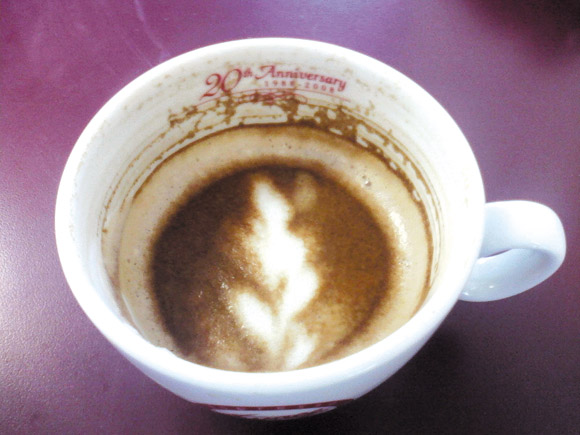Treasures Revealed Over Cappuccino

The author enjoys her cappuccino to the last drop as an enriching story unfolds before her | Jane Esaki photo
Serve me a beautifully crafted, frothy cappuccino in a thick, wide-mouthed porcelain mug in an air-conditioned café, place a great girlfriend across from me, and we will deliberate over every possible nook and cranny about every possible subject.
(Except math and science, of course, for I am rather susceptible to being disputed on matters relating to logic.)
This particular morning, however, I am with this fancy cup of joe at my favorite coffee shop, but with no close friend. What to do now?
Walls do not talk back or listen, and caffeine-induced brain activity should never go wasted if we are to have a purposeful day.
Sitting at the next table, in the corner, I notice a familiar older Japanese woman chatting about days of yore with the barista. Guess what, I may have found my muse!
Clad in a pretty pink-and-white polka-dotted blouse and comfortable, white, knee-length shorts, she is relaxed as she peruses an old high school yearbook. I might be able to extract some interesting anecdotes from this well-known community figure if I can nose into the conversation.
I steal right in, as most journalists are notoriously adept at doing, and suddenly I am like Leslie Wilcox on her Long Story Short talk show on PBS, firing away questions. Surprisingly, the quiet, modest woman willingly answers and slowly begins revealing snippets of her life on Kauai.
She offers a glimpse into her life: an amusing childhood at Kauai High School during World War II, when students blasted wind-up alarm clocks on soldiers stationed in an adjacent classroom; how the edge was taken off of poverty when her Buddhist parents were treated kindly at a Christian charity; how she unabashedly defended herself as a woman against inequities in the plantation workplace; how she playfully joined in on a food fight instead of being upset with her children after returning from a long day’s work; and about being a loyal wife to a sansei Japanese.
Over the past several decades, she earned a successful career and dedicated herself to a host of nonprofits. Volunteerism probably being her greatest achievement, she ends her narrative, saying she only meant to help others:
“If I did it for myself, then it wouldn’t be considered helping.”
I want to hear more from this patient woman, like a child begging for one more story before bedtime, but realize that I am keeping her talking longer than she expected. She begins to restlessly gather her handbag in her lap before repeatedly securing the straps onto her shoulder.
Finally, she gets up from her chair. As she passes me to leave, she taps me gently on the back of my shoulder, smiles and politely says, “It was nice talking to you.”
Actually, the pleasure was all mine. “It was nice hearing your story,” I respond.
The gig is now over. I look into my nearly empty cup, the fern-like image still aloft on the remaining foam.
This lovely cup of cappuccino had set the stage for my very own “Long Story Short” — a colorful dose of local history, fighting for what is right, devotion to family, loyalty to a partner and altruism — valuable components that certainly make for a complete documentary.
And, of course, a good muse to start a purposeful day.
janeesaki@gmail.com



